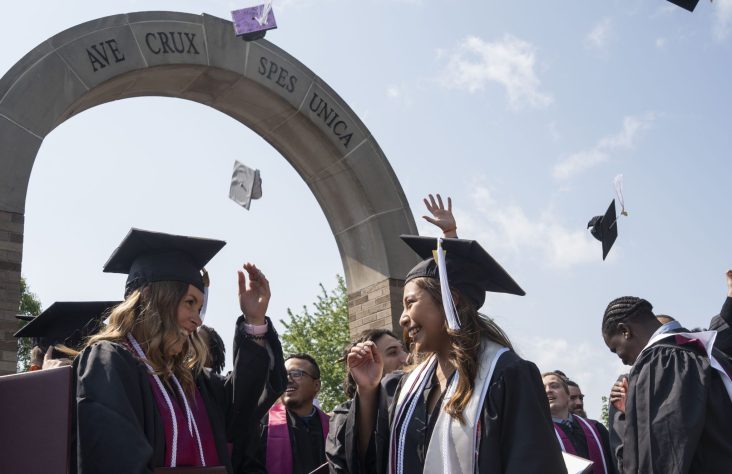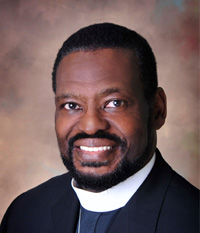April 8, 2014 // Local
Beneficial effects of marriage discussed at conference
By Ann Carey
NOTRE DAME — An April 3 student-organized conference on the definition and importance of civil marriage focused on the beneficial effect marriage has on society, and most especially on the most vulnerable members of society: children and the poor. It was the first of what is hoped to be an annual conference sponsored by Students for Child-Oriented Policy, a new University of Notre Dame student group focusing on promoting public policies that give primary consideration to how those policies will affect children.
The Presiding Bishop of the International Communion of Evangelical Churches, Bishop Harry Jackson, Jr., opened the conference. The senior pastor of Hope Christian Church in Washington, D.C., he has been in the forefront of advocating for traditional marriage, and he related some of the “battles” he and like-minded leaders have engaged in to protect the institution of marriage.
Small, well-organized groups of activists, he said, have succeeded in changing marriage laws well ahead of public attitudes and have mounted challenges to traditional marriage in the media, in the courts, in doctrinal attacks within churches and in the schools.
Bishop Jackson said that marriage is important to him as “a personal covenant, a sacred trust” between him and his wife of 37 years, but it is even more than that: “It is a foundational stone of our culture, and I believe that without it, there will be some tremendous consequences,” he said.
“When marriages are devalued, we find that around the world several things happen: When gay marriage or alternative marriages are allowed, then people start marrying later in life, out-of-wedlock births increase, divorces increase, and there is a fragmentation of not only the family structure but the sense of connection that kids have with their family. It creates all kinds of problems in our world.”
One of the arguments used for same-sex marriage, Bishop Jackson said, is that it is a civil rights issue. He explained that is an inaccurate comparison because the civil rights movement was based on prejudice about a person’s skin color and revolved around lack of opportunity for justice, fair wages and jobs, and access to housing, education and health care. None of those issues impact gays, he said, and in fact, people declaring themselves to be gay are often featured and praised in the media and are often treated as a special group.
Bishop Jackson, who is African-American himself, said that some of those who have been most adamant in fighting for traditional marriage are African-American and Hispanic Christian leaders. However, something happened in those communities when President Obama “evolved” his opinion to accept gay marriage, he said, for many people did not want to oppose the president on that issue.
This caused “a modest erosion” in support of traditional marriage in both the black and Hispanic communities, he said, but the majority of black Americans still do not support same-sex marriage.
In fact, he continued, “We realize that the traditional family could be part of the salvation of our community,” for children born into a family with a married mother and father are less likely to be poor, to drop out of school, to go to prison.
“Marriage as an institution is an anecdote to some of the biggest woes in urban American,” Bishop Jackson stressed.
Bishop Jackson said that preserving traditional marriage will be “a slow, arduous process,” but he believes the majority of Americans still support it. We are starting to see a push-back against attacks on supporters of traditional marriage, he said, and “We are poised to have a turnaround, a transformation, a counterattack in the area of resisting this redefinition of marriage.”
One challenge for churches and organizations that want to be faithful to the Christian perspective, he said, is to creative a “pro-marriage, attractive, engaging movement.” This must include strengthening traditional marriage, for it has become devalued among heterosexuals, as evidenced by the growing number of out-of-wedlock births and high divorce rate, he added.
Bishop Jackson encouraged the students to get involved in the issue, to do their part in celebrating and supporting and embracing the institution of marriage “across every denomination.”
Other speakers at the conference struck the same notes, that traditional marriage must be encouraged, for it is the best environment for rearing children and alleviating social problems.
A three-person panel included Jennifer Thieme of the Ruth Institute, who discussed the chaos and injustice visited on children of divorced parents; Gerard Bradley, a professor of Law at Notre Dame and father of eight, who stressed the biological unity of children to their parents, which he called a “matrix of equality, mutuality and common identity;” and Daniel Mark, a professor of political science at Villanova University, who urged continued resistance to the redefinition of marriage because “nothing less than the well-being of kids and the health of civilization” are involved.
Another panel consisted of Arina Grossu of the Family Research Council, who urged the students to support marriage not because it is tradition, but because it is part of human nature; Michael Bradley, a Notre Dame student and editor-in-chief of the newspaper Irish Rover, who suggested ways to promote traditional marriage in a positive, non-combative manner; and Katrina Harrington, a Notre Dame alumna, who explained how she details her own experience of wife and mother through her blog, “Cedars & Tiny Flowers.”
The evening banquet speaker was Robert Oscar Lopez, founder of the International Children’s Rights Institute and a professor of English at California State University. He described the difficulties of being raised by his mother and her same-sex partner, with little to no contact with his father. He said he supports civil unions for same-sex partners, but opposes the gay marriage lobby that wants to “deconstruct genetics from parenthood” and strip away the rights of children to be born free, not bought and sold; have both a father and a mother; and connect with their origins.
Other sponsors of the conference were Notre Dame’s Tocqueville Program for Inquiry into Religion and American Public Life, The Strake Foundation, the Ruth Institute, Love and Fidelity Network and the Irish Rover.
The best news. Delivered to your inbox.
Subscribe to our mailing list today.






